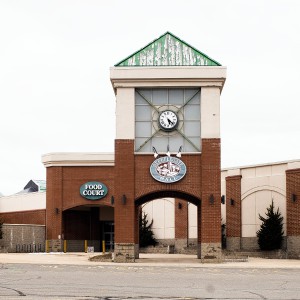Slain state hospital security officer was unarmed. State moves to change that.

| Published: 04-02-2024 1:00 PM |
The state is moving forward with what would be a significant change at New Hampshire Hospital: armed private security guards. The move is a response to the November fatal shooting of state hospital security officer Bradley Haas, who was unarmed in the hospital lobby, per hospital policy.
The Department of Safety announced Wednesday that it is seeking a private armed security company to provide armed officers for each shift.
While armed state police troopers have provided security on the Concord state office campus that includes New Hampshire Hospital since 2005, they have not been assigned to the hospital. A trooper was able to respond to Haas’ shooting quickly, fatally shooting the gunman, because the troopers’ headquarters is adjacent to the lobby.
Ellen Lapointe, chief executive officer of New Hampshire Hospital, said arming security officers in the hospital lobby is in line with policies at psychiatric facilities elsewhere in the country.
Doing so, however, would be in contrast to the state’s medical hospitals, where several security officials told the Bulletin they have opted not to arm officers, citing concerns that a firearm in a volatile situation could exacerbate, not mitigate, safety risks to patients, visitors, and staff.
Moving to armed security has posed a challenge for NAMI New Hampshire.
Executive Director Susan Stearns said security guards armed with guns in the lobby do not “make for the most welcoming environment.” But she and her members recognized there would be security changes after Haas’ shooting. She said she has appreciated the chance to share concerns with hospital leadership, especially given that the state announced its intention to arm officers 11 days after Haas’ death.
“November 17 was a horrific, traumatic event for everyone and especially our partners at New Hampshire Hospital and (the Department of ) Safety. I get that,” Stearns said. “I think we all need to make sure that we’re making decisions recognizing that a lot of people making these decisions have been through a tremendous traumatic event. And it’s good they’re seeking additional input.”
Article continues after...
Yesterday's Most Read Articles
 Neighboring landowner objection stalls Steeplegate redevelopment approval
Neighboring landowner objection stalls Steeplegate redevelopment approval
 How has Hopkinton, one of the smallest public schools in New Hampshire, become such a lacrosse powerhouse?
How has Hopkinton, one of the smallest public schools in New Hampshire, become such a lacrosse powerhouse?
 In Franklin, a Hometown Hero remains busy, 12 years after retiring from the U.S. Postal Service
In Franklin, a Hometown Hero remains busy, 12 years after retiring from the U.S. Postal Service
 Women at work on Warren: New combined salon, spa, DIY and retail space opens in former Peter’s Images location
Women at work on Warren: New combined salon, spa, DIY and retail space opens in former Peter’s Images location
 For some older Jewish professors at Dartmouth and UNH, opposition to campus arrests feels personal
For some older Jewish professors at Dartmouth and UNH, opposition to campus arrests feels personal
 New Hampshire Harm Reduction Coalition provides kits for safer drug use
New Hampshire Harm Reduction Coalition provides kits for safer drug use
The state is making other safety changes at the hospital that include redesigning the lobby as a single entry point for staff and visitors, and enhancing contraband screening equipment.
Separately, lawmakers are considering legislation filed in response to Haas’ shooting by a former patient, John Madore. The bill would require the state to submit some mental health records, such as those showing Madore had been committed to a psychiatric hospital, to gun background checks.
But it’s the armed security that would be the biggest change. And questions about where security officers could – and could not – have their firearms as well as their training are top of mind for mental health advocates.
The Department of Safety’s request for bids does not address when officers would be armed and unarmed. The Department of Health and Human Services’ security staffing policy limits armed security guards to the front lobby, “unless an emergency requires otherwise.” The policy does not define emergency, something Stearns said her organization raised concerns about.
“Anyone who has any experience with serious mental illness knows that emergencies are daily occurrences often, and I would imagine at an inpatient psychiatric hospital perhaps multiple times a day,” she said. “And very rarely is a firearm an appropriate response.”
Jake Leon, spokesperson for the Department of Health and Human Services, said guards would not be allowed to carry firearms on patient units or when otherwise interacting with patients, including when they arrive at the hospital or require transport to medical, legal, or other appointments.
To be considered for the private security contract, a bidder must have provided security in a hospital environment for at least three years, and will be given preference if they’d done so for five, according to the state’s request for bids. It does not specify that a security firm has experience in a psychiatric facility, though the request says providing security in a clinical setting is “highly desirable.”
Private security firms must submit bids by April 30, but it’s unclear when officers may start.
Lapointe said her team worked with NAMI New Hampshire in creating its policy and training requirements for armed security officers, which would include learning how to work with vulnerable people in community or institutional settings.
Members also shared their experiences and firsthand knowledge of the hospital’s facility and provided input on firearms in the hospital.
Stearns said she was told that New Hampshire Hospital plans to provide the private security officers the same training it provides its staff, including de-escalation techniques and how to respond to people in psychiatric crises.
“We have engaged with NAMI and we’re going to continue to engage with NAMI on what the training looks like for these individuals before they start this process,” Lapointe said.
Private security officers would be under the supervision of the Department of Safety. However, if officers are called by clinical staff to help with a patient safety issue, they would be under the direction of a registered nurse, according to the hospital’s staffing policy.
That’s critical, Stearns said, because clinical staff has the training and knowledge of the patient a security officer mostly likely would not.
The staffing policy also includes a list of principles with patients’ needs in mind, a priority for mental health advocates.
“For some, the presence of security professionals to help de-escalate a situation may be reassuring,” it says. “For others, it can be triggering of past incidents and impact the ideation of harm to self or others. The safety approach taken in a psychiatric facility must be carefully and thoughtfully calibrated to account for these risks and consideration.”







 Granite Geek: Can you grow radishes on the moon? NHTI students tried
Granite Geek: Can you grow radishes on the moon? NHTI students tried Adam Montgomery sentenced to minimum 56 years on murder charges in young daughter’s death
Adam Montgomery sentenced to minimum 56 years on murder charges in young daughter’s death Following budget cut, Pembroke revisits future of elementary school re-build
Following budget cut, Pembroke revisits future of elementary school re-build
